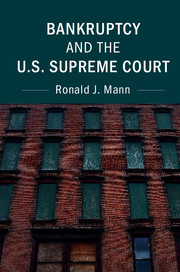Book contents
- Frontmatter
- Contents
- List of Figures
- List of Tables
- Preface
- Introduction
- PART I SETTING THE STAGE
- PART II THE HARD CASES
- SECTION A MISSED OPPORTUNITIES: CONGRESS, THE COURT, AND THE BANKRUPTCY CLAUSE
- SECTION B INTERPRETIVE STRATEGY: THE COURT, THE SOLICITOR GENERAL, AND THE CODE
- PART III AMICI AND THE COURT
- PART IV CONCLUSION
PART II - THE HARD CASES
Published online by Cambridge University Press: 04 May 2017
- Frontmatter
- Contents
- List of Figures
- List of Tables
- Preface
- Introduction
- PART I SETTING THE STAGE
- PART II THE HARD CASES
- SECTION A MISSED OPPORTUNITIES: CONGRESS, THE COURT, AND THE BANKRUPTCY CLAUSE
- SECTION B INTERPRETIVE STRATEGY: THE COURT, THE SOLICITOR GENERAL, AND THE CODE
- PART III AMICI AND THE COURT
- PART IV CONCLUSION
Summary
We turn now to the heart of the project: studies of particular cases. Recognizing the arbitrariness of selecting any small group of cases, we have settled on nine cases to study in detail. As emphasized above, the principal factor driving our selection was the desire to identify a group of cases in which the Justices are relatively free of legal, institutional, and strategic constraints. On the first point, the close division of the Justices in their resolution of these cases provides an excellent proxy for the indeterminacy of the legal doctrine. It well may be that most of the cases that reach the Supreme Court are sufficiently close to bear an important element of indeterminacy, but those that are closely divided even at that level are paradigmatic examples of a lack of binding legal constraint. As for institutional and strategic constraints, the premise is that the focus on a topic of little policy salience to Congress or the Justices themselves resolves those issues adequately; the previous chapter pointed out that only one of the Court's eighty-two bankruptcy decisions ranks as “salient” by conventional criteria. In a policy backwater such as bankruptcy, the likelihood of institutional “pushback” from Congress or strategic repercussions among the Justices in later cases seems quite unlikely. No set of cases is perfect, but we believe that the case studies below provide an unparalleled laboratory for studying how the Justices resolve cases in which they have broad freedom to act.
Although we say much below about those decisions, we leave much unsaid. The question naturally arises of how we came to shape the narratives that we offer. For the most part, we have been guided by interest in the Court's framing and resolution of the issues before it: What the Justices take for granted, what the Justices regard as difficult to contest, and what the Justices regard as debatable. The resulting narrative emphasizes the process by which the Court sifts through the materials that come to it to formulate a ground for decision.
- Type
- Chapter
- Information
- Bankruptcy and the U.S. Supreme Court , pp. 37 - 38Publisher: Cambridge University PressPrint publication year: 2017



